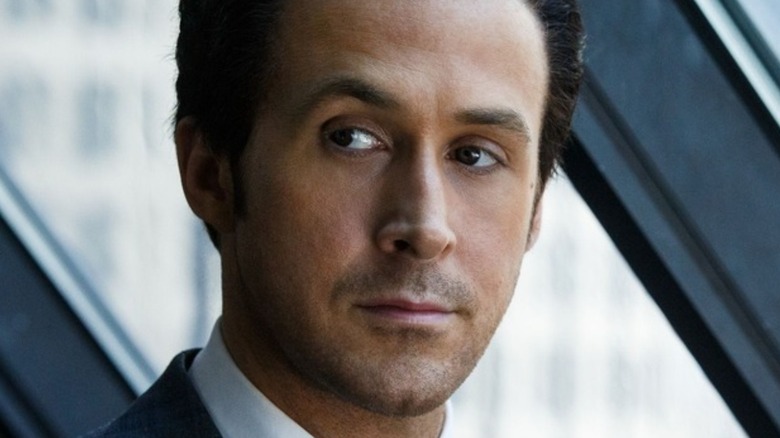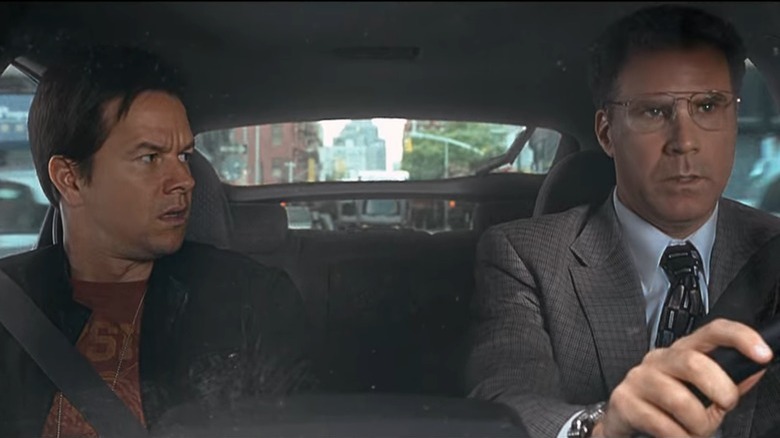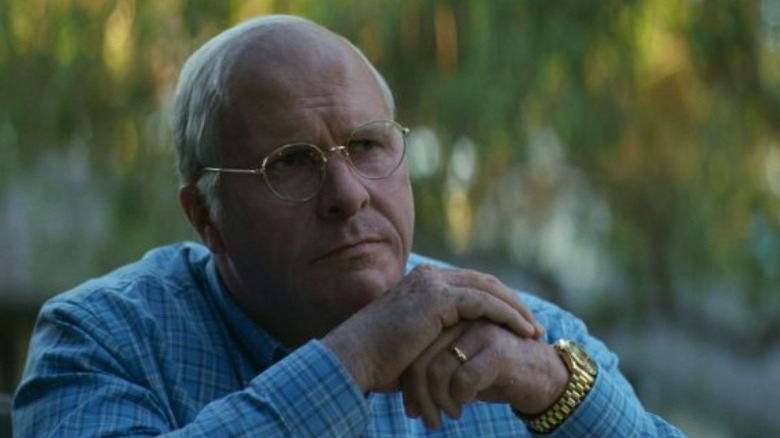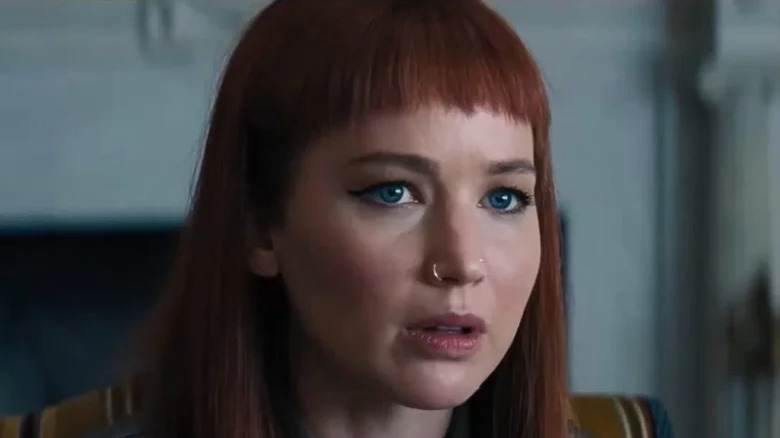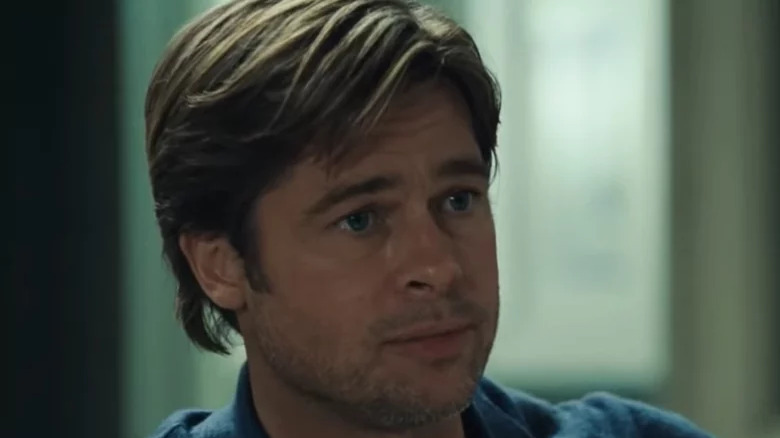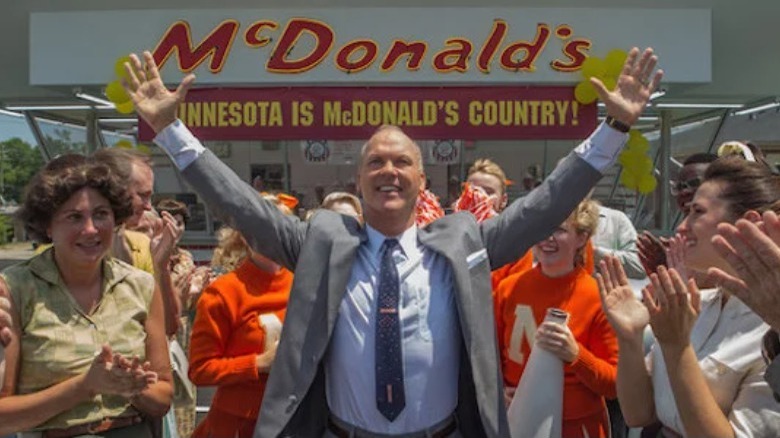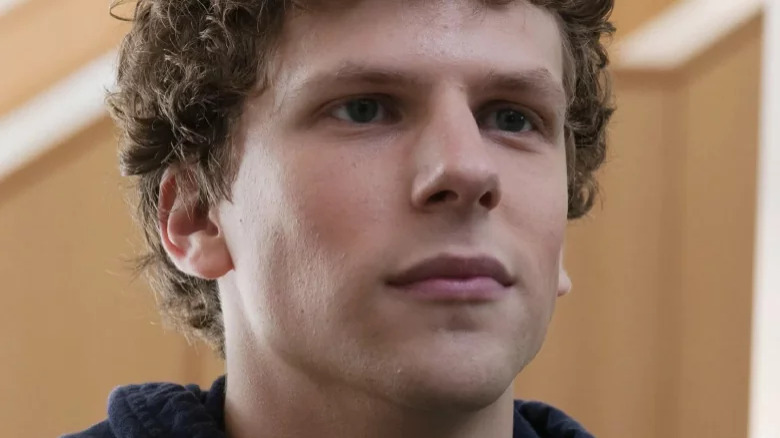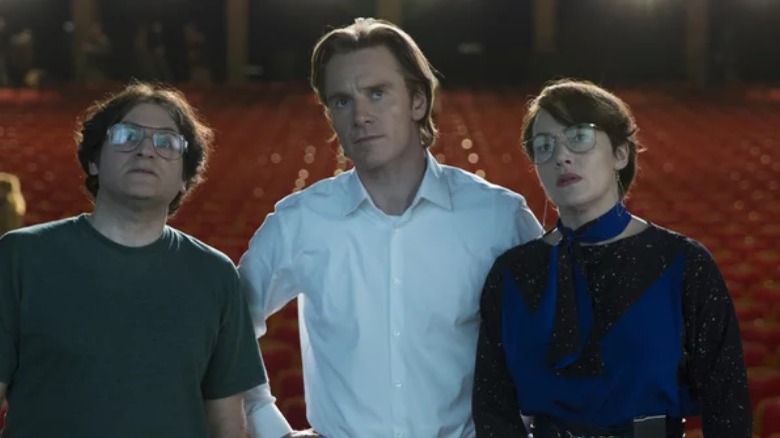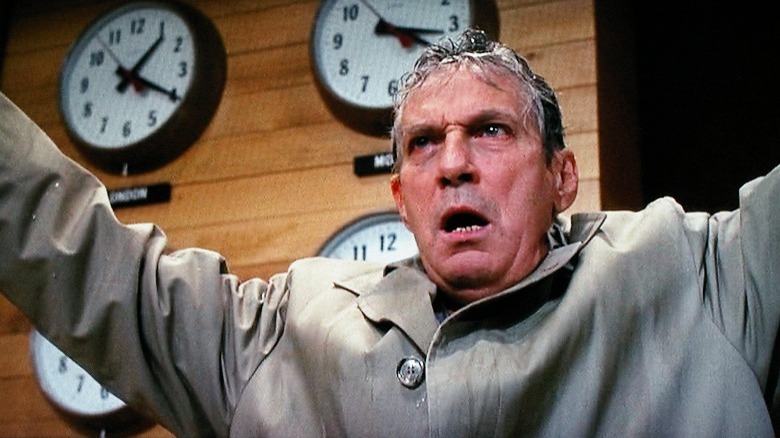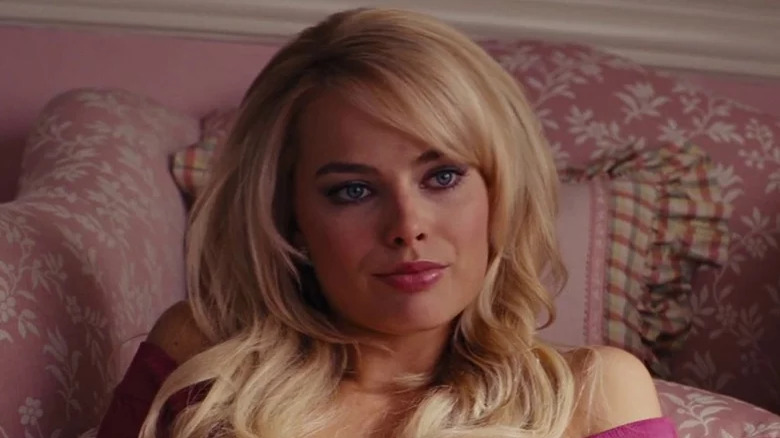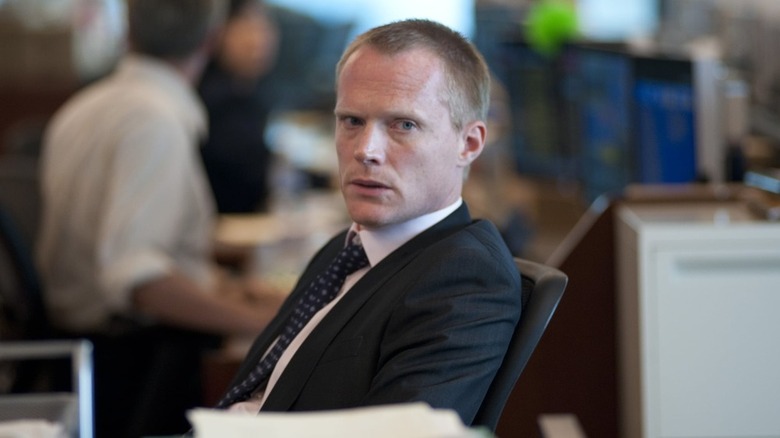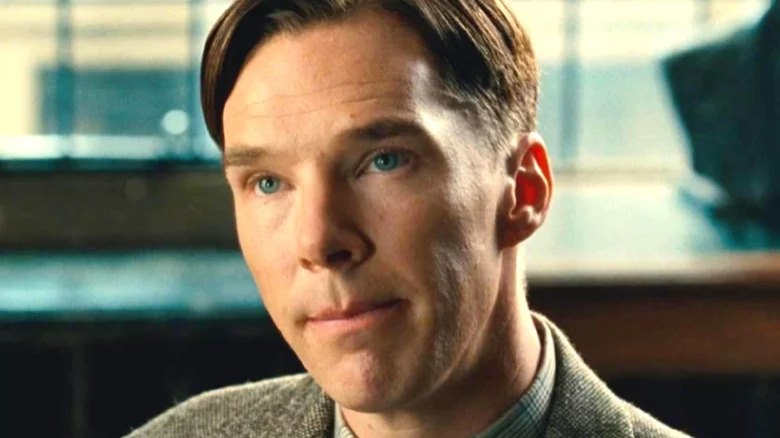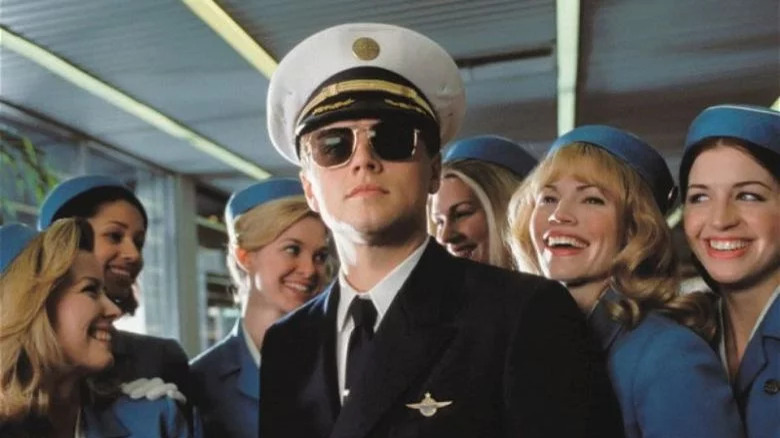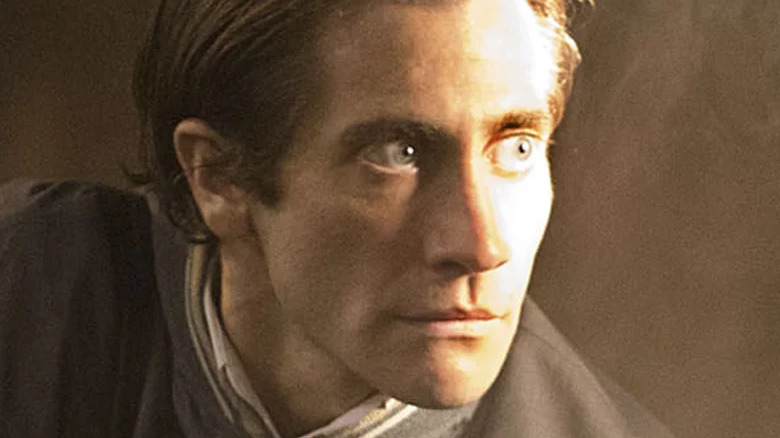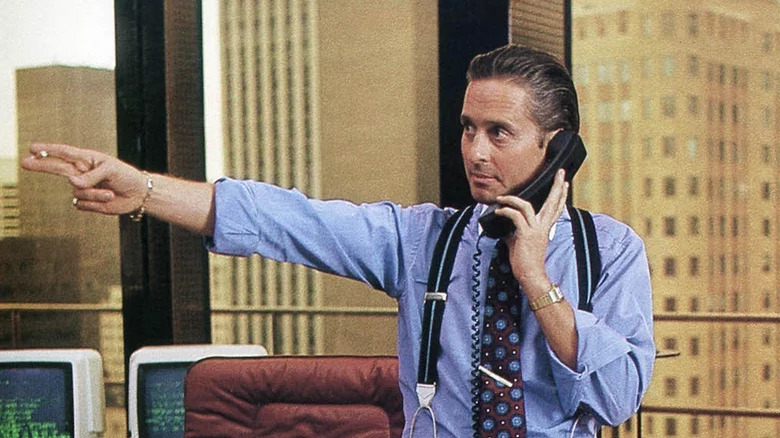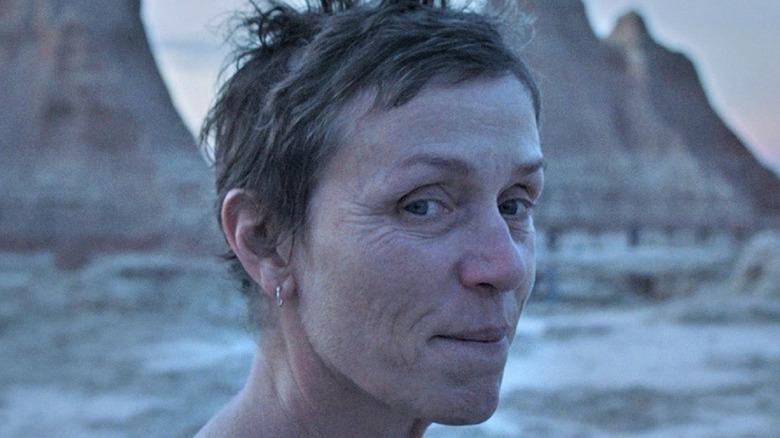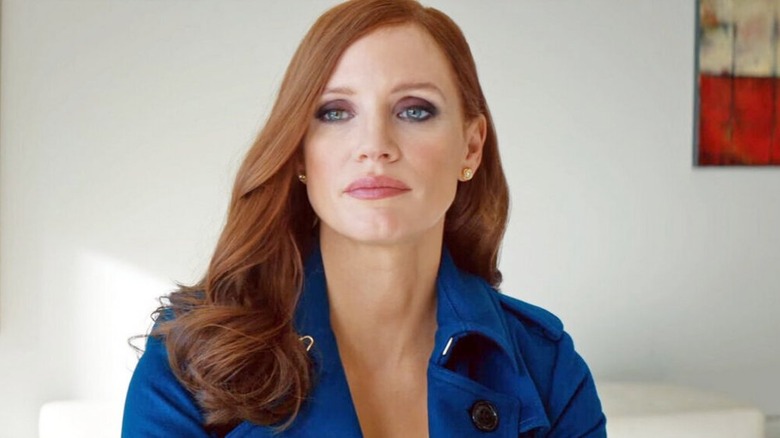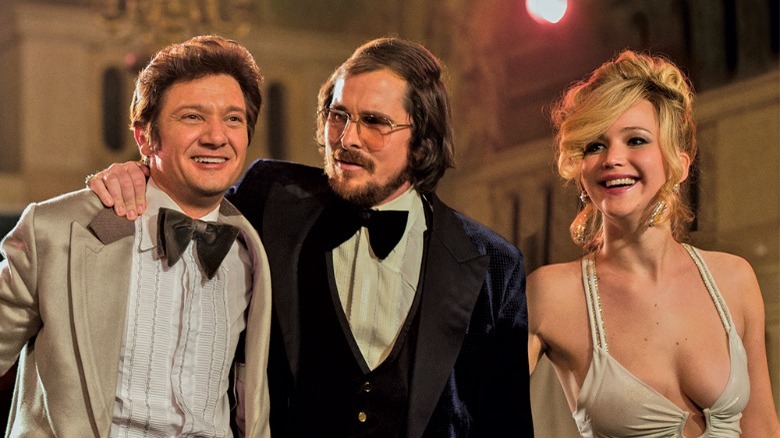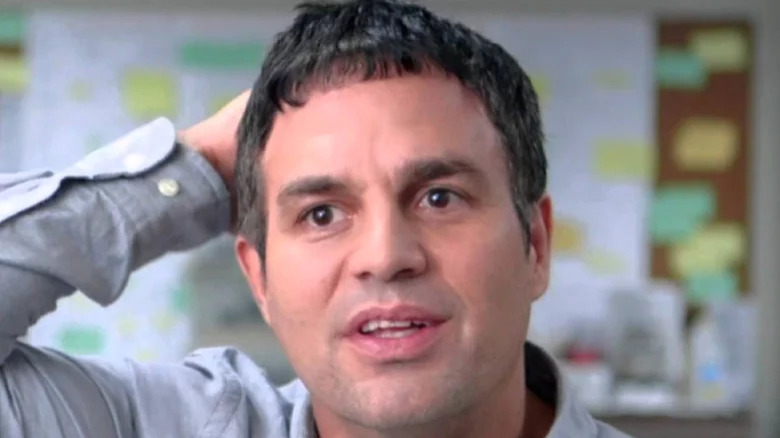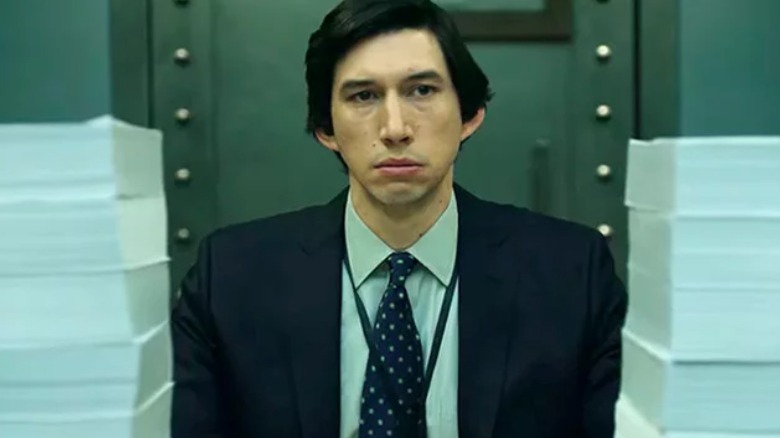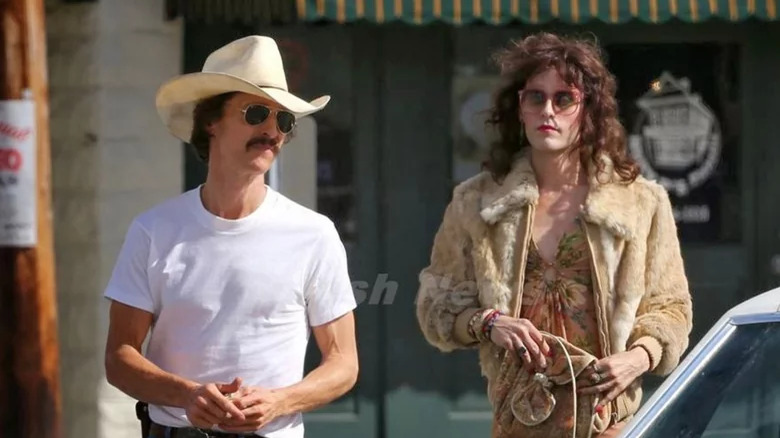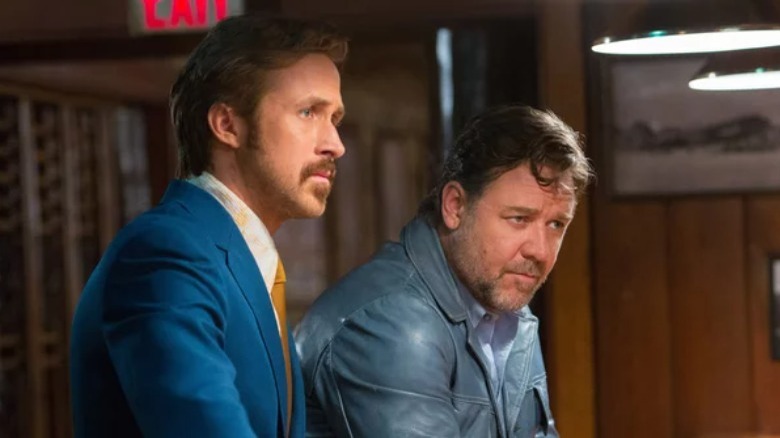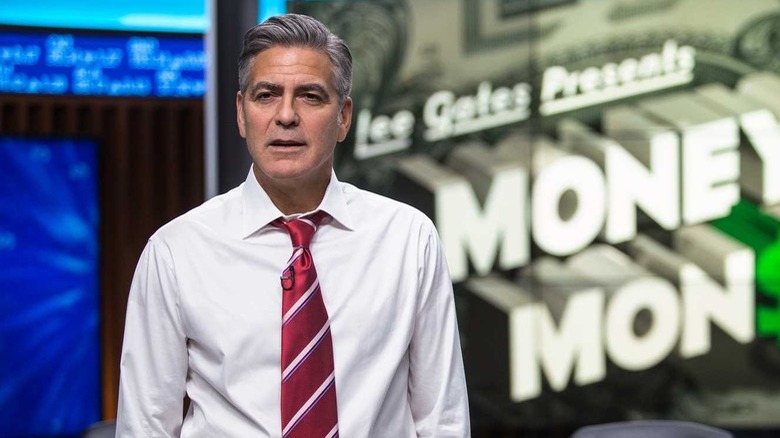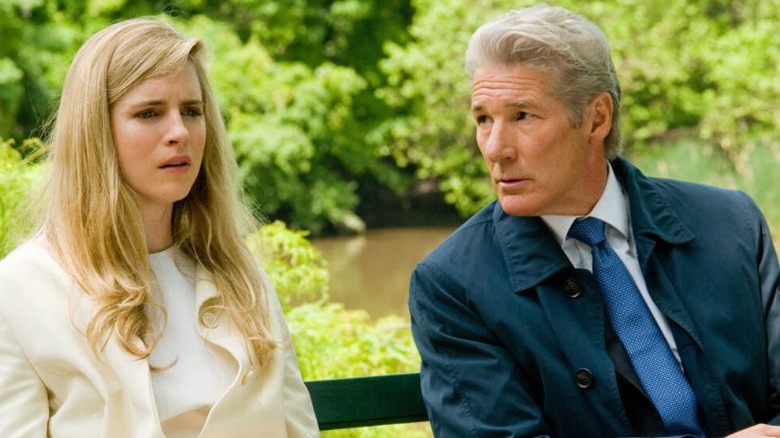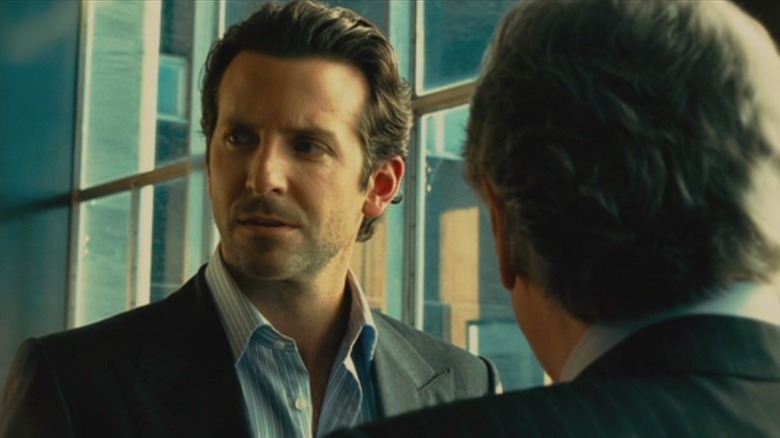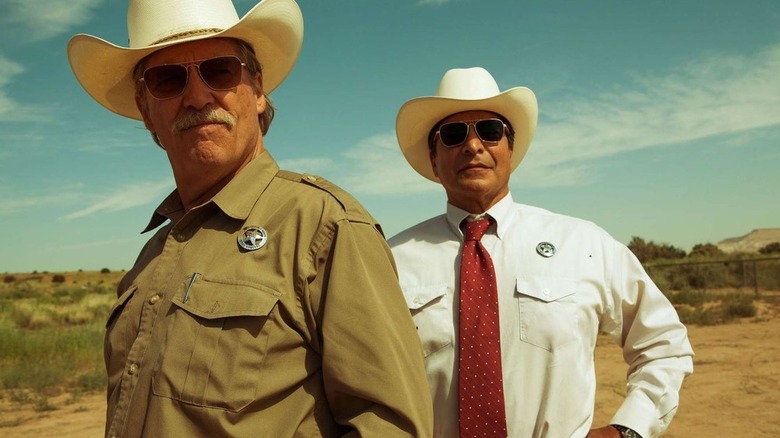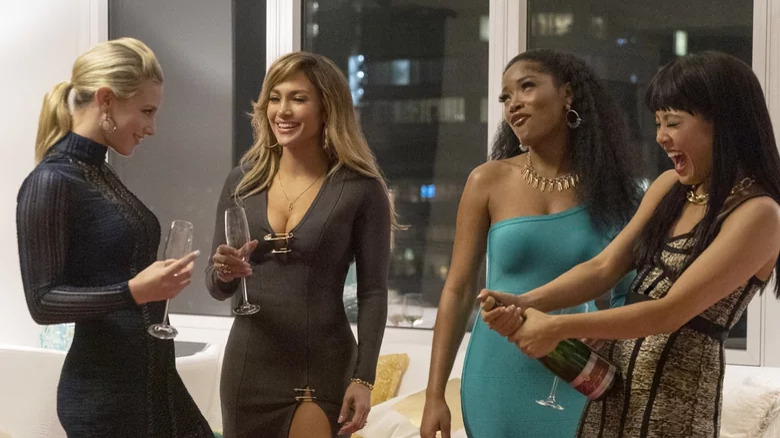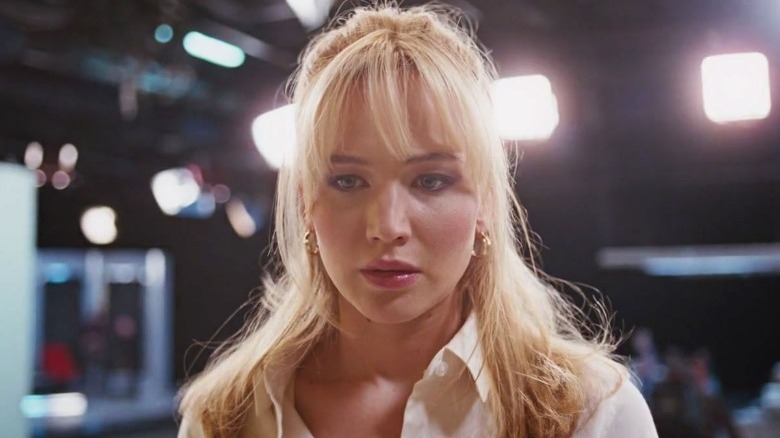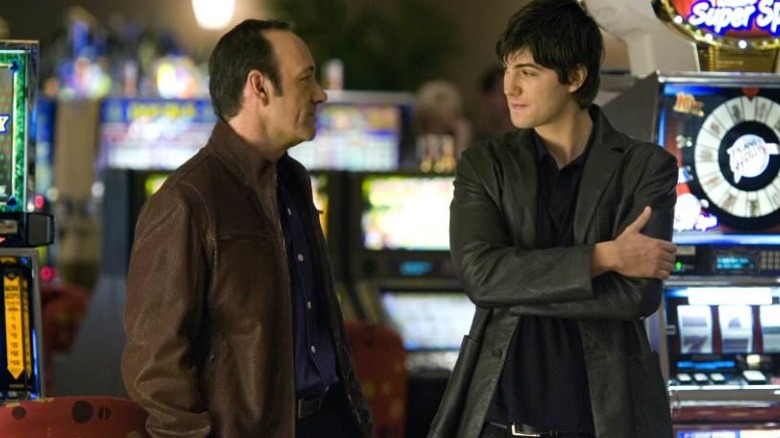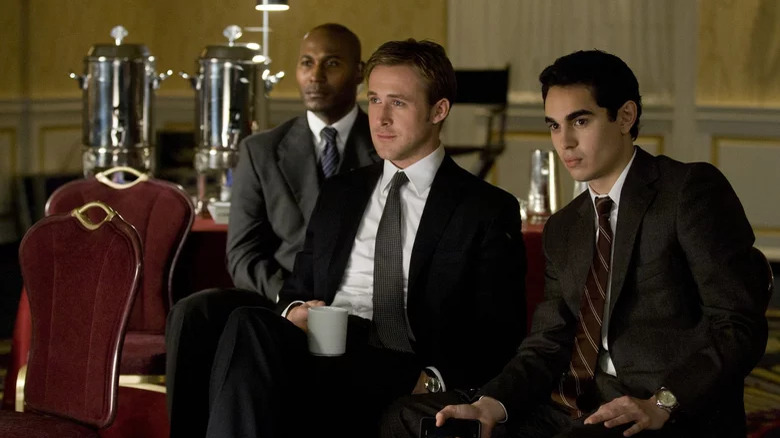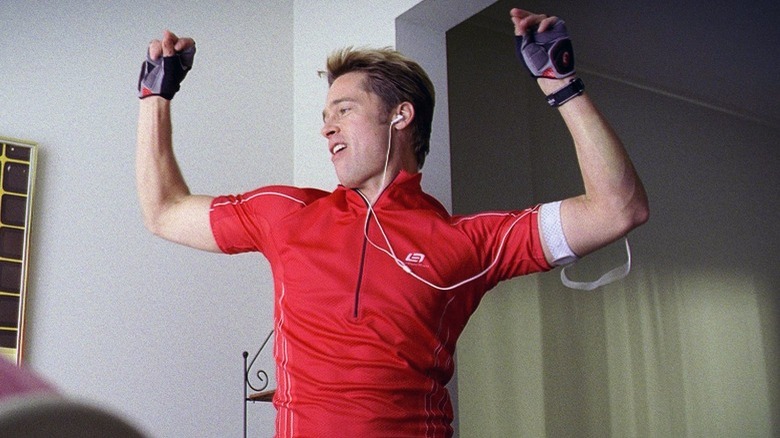30 Great Movies Like The Big Short You Need To Watch Next
We live in confusing times. The stock market is something that our 24-hour news cycle likes to barrage us with information about, because in theory it's closely tied to the health of the American economy. But reports indicate that the wealthiest 10% of Americans own 89% of stock holdings, so by and large most of us aren't impacted by the daily fluctuations of the market. Every now and then, however, the banks and traders mess up on a large enough scale that millions of people in the bottom 90% lose their jobs, like during the Great Recession of 2007 to 2009 after the bursting of the housing market bubble.
Adam McKay's 2015 film "The Big Short" was an attempt to explain what happened to those of us that don't know (or really care) what precisely a "credit-default swap" or a "collateralized debt obligation" is. Following the stories of a few different traders that were smart enough to see the collapse coming, it explained a complicated economic crisis in simple terms, and made palpable a sense of frustration and outrage that hardly anyone got in trouble for tanking the global economy. It marked a turning point in McKay's career from silly comedies to a new sort of cinematic journalism, and impacted the way we think about the stock market.
Here are 30 great movies like "The Big Short" that educate while they entertain, and point to the larger, invisible forces that have shaped the world we live in.
The Other Guys
McKay's transition to a new kind of filmmaking arguably started with 2010's "The Other Guys." While it's ostensibly an action-comedy about a mismatched pair of cops, the big scheme they uncover turns out to involve the use of the NYPD pension fund to prop up a "Ponzi scheme" that's being managed by a shady investment firm. In the end, just like after the real-life housing crisis, the investment firm is bailed out by the government.
The end credits then use a charmingly animated infographic to outline the depths of Bernie Madoff's notorious Ponzi scheme, and the general details of the housing crisis and the bailouts given to firms like AIG and Goldman Sachs. "The Other Guys," silly as it is, is sort of a stealth prequel to "The Big Short."
Vice
Adam McKay's follow-up to "The Big Short" — for which he won a Best Adapted Screenplay Oscar — was an attempt to take on the entire military-industrial complex with a fantastical, gonzo trip through Dick Cheney's entire life. Obviously your political mileage may vary, but "Vice" is a wild and experimental ride that takes the fourth wall-breaking moments of "The Big Short" and ramps them up a few notches.
At various points characters break into iambic pentameter, documentary-like media montages cover the span of years, and the whole thing is narrated by Cheney's eventual heart donor. As a film, it's a little messy, but as a document of 21st century life, it's unmissable.
Don't Look Up
"Don't Look Up," released in December 2021, sees Adam McKay taking his new "movie as op-ed piece" formula and perfecting it into a screaming, manic frenzy. A modern-day "Dr. Strangelove," "Don't Look Up" is a thinly-veiled satire about climate change and its existential threat to humanity, but also takes on the media, our polarized political system, and our response to the pandemic while it's at it.
If "The Big Short" has a main flaw it's that the "heroes" of the movie are investors that were already pretty rich to begin with. The main characters of "Don't Look Up" are much more clear stand-ins for regular people, knowing that the world is ending and full of an aimless rage that no one in power is doing anything about it.
Moneyball
The author of the book "The Big Short," Michael Lewis, has a knack for finding stories about outsiders who disrupt old and stagnant systems. His book "Moneyball" was adapted into a film in 2011, and tells the story of how the Oakland Athletics used statistical analysis to build an unconventional path to the playoffs in 2002.
Since the book and film came out, the so-called "Moneyball effect" has quietly revolutionized most major sports, as teams rely more and more on statistical analysis instead of the ancient, colloquial wisdom of scouts and coaches. Like "The Big Short" it's a testament to having faith in the numbers.
The Founder
"The Founder" is the story of McDonald's, restaurants so ubiquitous and common to us that they seem like a natural part of the landscape. Michael Keaton puts in a superb performance as Ray Kroc, a downtrodden traveling salesman who encounters the very first McDonald's restaurant, and slowly takes over the business from the brothers that founded it to make it an international staple.
"The Founder" is a movie about persistence, patience, and process — the highlight of the film, when the McDonald brothers explain their "Speedee Service System" that revolutionized fast food as we know it, basically plays out like reading a non-fiction book, but it's so enthralling that you hardly notice.
The Social Network
Very few of us own stocks, but we're nearly all on Facebook. So 2010's "The Social Network" is an even more important dramatization of how we got to this point in history, the origin story of the website that's vacuumed up endless hours of our daily lives and wired the sight of little red notification numbers into our dopamine receptors.
Writer Aaron Sorkin and director David Fincher made "The Social Network" into a stunning, layered portrayal of creative inspiration, intellectual property theft, and the cascade of litigation that follows billions of dollars of success. It might be the most relevant and contemporary movie of our lifetimes.
Steve Jobs
Another Aaron Sorkin screenplay, "Steve Jobs," is a portrait of the man who made the technology we use so ubiquitous and pervasive. Director Danny Boyle brings a dynamic visual flair to a talky, theatrical script about three important product launches in Steve Jobs' life: the original Macintosh computer (which flopped), the Next workstation (which also flopped), and the first iMac in 1998 (which sold so well it pushed us into the era of personal computing once and for all).
Though it plays a little loose with history, "Steve Jobs" is an illuminating look at how one man, by the force of his personality and vision, bullied others into creating the future we live in.
Network
There's a moment in "The Big Short" when characters try to go to the press to expose collusion between the banks and regulatory agencies, but their contact at the Wall Street Journal essentially admits that his paper is too beholden to the banks to run the story. Sidney Lumet's classic black comedy "Network" is a treatise on how our media is driven primarily by ratings and profit.
In fact, the rantings of Howard Beale (Peter Finch), who "snaps" at the beginning of the film, would be at home on any number of our outrage-driven cable news and radio channels in the modern age. No film is more over-the-top and simultaneously prophetic as "Network."
The Wolf of Wall Street
It's kind of boring to watch "The Big Short" and watch millionaires stare at computer screens. The only hint of real luxury is a moment when Margot Robbie appears in a bubble bath to explain what sub-prime mortgages are. So don't miss "The Wolf of Wall Street," Martin Scorsese's epic adaptation of Jordan Belfort's memoir about the excesses and insanity of his run of Wall Street fraud.
Leonardo DiCaprio plays Belfort as he goes from pumping and dumping penny stocks to large-scale fraud, and as a bonus Margot Robbie joins in the fun as Belfort's second wife. Like "The Big Short," it ends with little consequences for the scam artists, but at least as viewers we have a lot more vicarious fun.
Margin Call
"Margin Call" is basically a companion piece to "The Big Short": it portrays the night that an unnamed investment firm figures out far too late that the housing bubble is bursting, and that they're about to sustain massive losses. A superb cast including Paul Bettany, Jeremy Irons, and Demi Moore manage to make a movie that consists of mostly boardroom conversations downright riveting.
"Margin Call" and its characters deal with an existential aspect of the financial crisis that "The Big Short" only hints at: entire branches of banks and investment firms are devoted solely to calculating risk, and they didn't see the financial crisis coming. How do you move on after failing that spectacularly?
The Imitation Game
Christian Bale's performance as eccentric genius Michael Burry is one of the more compelling emotional aspects of "The Big Short," especially as his big bet against the housing market doesn't seem to be paying off at first. Alan Turing, one of history's foremost eccentric geniuses, is brought to life by Benedict Cumberbatch in "The Imitation Game," and has to stay true to the course of his inspiration with much more at risk than a bunch of investors' money.
The true story of how Turing cracked the Germans' "Enigma" encryption method during World War II, "The Imitation Game" is a fascinating story about cryptography and the founding of modern computer science.
Catch Me If You Can
Everyone in "The Big Short" sure pulls one over on the banks, but they're also basically bankers themselves, which isn't that satisfying. The classic con man caper "Catch Me If You Can" will make you wish you could go back to the '70s and do a little light forgery, since the banks were a lot easier to fool before they relied on electronic computer networks.
Leonardo DiCaprio stars as real-life trickster Frank Abagnale Jr., who passes millions of dollars in fake checks and relies on obscure knowledge of routing number procedures and printing processes to get away with it. He also pretends to be a pilot, doctor, and college professor, and has a grand old time with it all.
Nightcrawler
The biggest disconnect in the "The Big Short" is the idea, only referenced a few times, that all of these men in suits are profiting off the collapse of real people's mortgages. It doesn't exactly bridge the distance between the towers of capitalism on Wall Street and the blood of the working people that the system is built on top of.
"Nightcrawler" makes that blood terrifyingly real, as a sociopath played by a bug-eyed Jake Gyllenhaal uses a dogged, business-speak-infused approach to rise through the ranks of Los Angeles cameramen that prowl the streets overnight to get footage of gruesome car accidents and crimes for the local news. Like a smaller, more chillingly realistic "Network," it takes the maxim "if it bleeds, it leads" and runs with it.
Wall Street
No understanding of Wall Street is complete without watching the movie named after it, Oliver Stone's classic "Wall Street." Charlie Sheen, Daryl Hannah, and Michael Douglas as the iconic Gordon Gekko star in a movie that exposes how thin the line between insider trading and investing "honestly" in the stock market really is.
Despite being an allegedly cautionary tale, "Wall Street" has become a formative part of American culture that's actually inspired whole generations to become stockbrokers. It seems impossible not to take the famous "Greed is, for the lack of a better word, good" speech at face value, but the excesses and dishonesty that led us to "The Big Short" bear out that plenty of people did.
Nomadland
2020's Best Picture winner "Nomadland" is a story about the world that the collapse in "The Big Short" created. As wages have remained stagnant and the mortgage crisis made property harder and harder for the working class to buy, more Americans have taken on nomadic lifestyles: many of them were featured in Jessica Bruder's book, and actually played themselves in the film adaptation by Chloe Zhao.
Frances McDormand won an Oscar as well for her heartbreaking portrayal of Fern, a travelling worker who lost her home and job when a gypsum plant closed down in 2011. While not tied directly to the housing crisis, Fern is a stand-in for the millions of Americans that have had to reinvent themselves when the storms of larger forces disrupt their lives, from the Great Depression to the pandemic.
Molly's Game
Stocks are basically a more legal way to gamble, so why not just gamble instead? "Molly's Game," Aaron Sorkin's directorial debut, is a fascinating tour through the underworld of private high-stakes poker games, anchored by a great lead performance from Jessica Chastain.
Based on the experiences of the real Molly Bloom, "Molly's Game" traces its heroine's journey from celebrity poker to running afoul of the FBI as well as the Russian and Italian mobs, all this in addition to an inevitable drug problem. As with all stories involving absurd amounts of money, it ends with a slap on the wrist and a memoir that gets turned into a movie.
American Hustle
David O. Russell's "American Hustle" is a classic caper film set at the intersection of small-time con artists, the Mafia, and politics. A heavily dramatized version of the real-life Abscam scandal that occurred during the '70s, it stars "The Big Short" lead Christian Bale as a grifter that's forced by the FBI to help capture corrupt politicians, with his wife (Jennifer Lawrence) and mistress (Amy Adams) forced to play along as well.
"American Hustle" scored major Oscar nominations for Russell and pretty much all of its cast, and shouldn't be missed if you're a fan of transformative Christian Bale performances or stories about massive American malfeasance.
Spotlight
In contrast to many of the films on this list, in "Spotlight" the good guys win. Inspired by real events, the film chronicles how the Boston Globe's "Spotlight" investigative division breaks open a series of stories in 2002 on Catholic priest abuse scandals in the Boston area. The Best Picture-winning film follows the story from its initial inception all the way through the endless hours of chasing down leads and putting the pieces together.
There's perhaps no better film about the commitment to exposing truth that speaks to the highest ideals of journalism, at a time when the internet was only just beginning to turn the entire industry upside down. "Spotlight" handles a gravely serious story with the respect and commitment it deserves.
The Report
If you're a fan of dogged analysis, check out the relatively unheralded 2019 Amazon Studios movie "The Report." Much like "The Big Short," it makes a real, complicated story into a simple and coherent one. Adam Driver plays a member of Senator Dianne Feinstein's staff who's charged with reviewing six million pages of documents about the CIA's "enhanced interrogation techniques" enacted after the War on Terror began.
Also like "The Big Short," it ends on a largely frustrating and disappointing note in terms of consequences, but if you lived through the 2000s, "The Report" is illuminating and essentially viewing.
Dallas Buyers Club
During the pandemic, we've seen the FDA respond rapidly to authorize new drugs to fight the coronavirus, which seems like a natural and obvious strategy. "Dallas Buyers Club" is the dramatization of the true story of the FDA's lack of action during the AIDS crisis, as a man named Ron Woodroof had to work to get himself and many others drugs that helped prolong the lives of AIDS patients that the FDA was slow to approve or consider.
Actual Dallas native Matthew McConaughey won an Oscar for his lead performance, as did Jared Leto in a supporting role. "Dallas Buyers Club" is a by turns compelling and heartbreaking look at a struggle against the intransigence of our healthcare system.
The Nice Guys
In "The Nice Guys," "The Big Short" star Ryan Gosling plays an inept private detective that ends up in the middle of another huge conspiracy, this time by the auto industry. "Lethal Weapon" writer and "Kiss Kiss Bang Bang" director Shane Black creates a breezy, intoxicating view of 1977 Los Angeles in a movie that's become an instant classic.
Gosling's chemistry with Russell Crowe all but begs for a sequel, but for now "The Nice Guys" is a classic tale of the little guys scoring a rare victory over the forces of capitalist industry. Granted, the industry at large didn't suffer many consequences for suppressing the catalytic converter, but we can dream.
Money Monster
Jodie Foster's "Money Monster" is a fictional take on an all-too-real situation. Our media landscape is populated by dozens if not hundreds of "experts" that tell you where to invest your money, but they're wrong just as often as they're right, and people can lose their entire life savings by taking the wrong advice.
A man takes one such television expert played by George Clooney hostage in "Money Monster," a thriller that plays out almost in real time. Though the plot gets more convoluted than that, the premise is a simple reminder that the stakes of playing the market are a lot higher for people that don't already have millions to lose.
Arbitrage
"Arbitrage" is a quiet, solid thriller about a hedge fund manager who has trouble keeping both his figurative and literal bodies buried. Richard Gere gives a commanding lead performance as Robert Miller, who has been lying to his investors and his family and growing increasingly more desperate as his bills come due.
Susan Sarandon, Tim Roth, and Brit Marling round out the small cast of Nicholas Jarecki's directorial debut. If "The Big Short" leaves you wanting to watch a desperate banker squirm under the weight of his mistakes, "Arbitrage" should be more than satisfying. A bed of lies isn't terribly comfortable to lie in, as it turns out.
Limitless
Forget hacking the financial system. What if you could unlock the potential of your own mind? Bradley Cooper and Robert De Niro star in "Limitless," a movie that takes the widely repeated myth that we only use 10% of our brains and runs with it to extreme, ludicrous places.
Given access to a drug that actually does what all the various "nootropics" we can buy online actually promises to, Cooper's character goes from a struggling writer to a visionary genius in no time flat. He of course manipulates the stock market in classic "The Big Short" style, as his new brain allows him to see things no one else can — at least for a while.
Hell or High Water
As "The Big Short" breezes through its story, it's easy to forget that the entire financial crisis started with mortgages, mortgages that ended with very real and very heartbreaking foreclosures. "Hell or High Water" is a throwback to old school Westerns in telling the story of a pair of bank-robbing brothers, but their motivation is to get revenge on a bank that targeted their mother with a different sort of predatory practice called a "reverse mortgage."
Jeff Bridges stars (as the sheriff out to catch the brothers), along with Chris Pine and Ben Foster, in a movie that turns out to be surprisingly emotional and psychological in addition to thrilling.
Hustlers
"Hustlers" is yet another story about the extended fallout of the housing crisis, as the recession that followed upended even the stripping industry. With fewer high-rolling targets, a group of strippers start to drug their businessmen clientele (many of them perhaps the Wall Street perpetrators themselves) with ketamine and MDMA, then run up huge charges on their cards while they're out of it.
Spiritually, it's not that different than bundling sub-prime mortgages into CDOs, but it's way more fun to watch. Lorene Scafaria's film has a great cast anchored by a stunning as ever Jennifer Lopez, and is well worth your time.
Joy
Before there were NFTs, cryptocurrency, and even before the stock market, the way many people daydreamed of getting rich was to invent something. David O. Russell's 2015 movie "Joy" stars Jennifer Lawrence as the real-life Joy Mangano, who invents a self-wringing mop that launches her to phenomenal success and upends her life along the way.
It's both a traditional rags-to-riches story as well as a cautionary tale about money and capital: as soon as Joy has even a little success, she's beset by fraudulent manufacturers, inept TV presenters, and even a corporate takeover attempt from her own father and sister. No matter how many movies tell us that money doesn't buy happiness, we love watching more stories about getting rich.
21
Based on another book by Ben Mezrich, who wrote the story of Facebook that "The Social Network" was based on, "21" is the loosely-adapted true story of how some MIT grad students perfect a card-counting system to win at blackjack and head to Vegas to take on the big casinos.
While the film is a pretty standard rise and fall story, the actual mechanics of card-counting are surprisingly simple: one person keeps track of the flow of high value cards and signals another one when to start betting big. It makes you daydream about hitting the nearest casino with a friend — and your fingers crossed behind your back.
The Ides of March
Despite being the narrator, Ryan Gosling's Jared Vennett doesn't have a huge role to play in "The Big Short." Check out 2011's "The Ides of March" to see Gosling deploy his steely, smooth operator persona in a larger role, and in the world of DC politics. George Clooney directs and co-stars in the film, which also features fantastic turns from Paul Giamatti and the late Philip Seymour Hoffman.
Based on Beau Willimon's play "Farragut North," it has all the themes and intrigue of Willimon's Netflix series, "House of Cards," but only takes two hours to watch instead of multiple days of bingeing (and doesn't have any problematic leads).
Burn After Reading
When you think about the housing crisis in the broad sense, you might wonder how the government let it happen in the first place, or why there were so few consequences. "Burn After Reading," the Coen brothers' underrated black comedy about the CIA, has a bleak view of the incompetence of our government's ability to assemble intelligence of any sort, let alone the depth of knowledge the SEC would have needed to be effective in 2007.
At the end of the movie, a character wonders something that applies to many of these movies about the confusing intersection of fate, numbers, and stupidity: "What did we learn?" He realizes that the answer is nothing, except perhaps a vague and bewildered resolution to try and avoid the same mistakes in the future.
